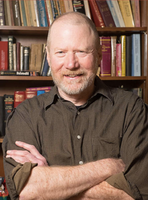Difference between revisions of "Huntington, C."
| Line 2: | Line 2: | ||
|HasDrlPage=Yes | |HasDrlPage=Yes | ||
|HasLibPage=Yes | |HasLibPage=Yes | ||
| − | |||
| − | |||
| − | |||
|MainNamePhon=C.W. "Sandy" Huntington | |MainNamePhon=C.W. "Sandy" Huntington | ||
|SortName=Huntington, C. | |SortName=Huntington, C. | ||
| − | |namefirst=C. | + | |namefirst=C. W. "Sandy" |
| − | |||
|namelast=Huntington | |namelast=Huntington | ||
| + | |bio=[C. W. "Sandy"] Huntington was known foremost for his work in Mahayana Buddhist thought, in particular the Madhyamaka philosophy of India and Tibet. More recently, he published a novel, Maya (Wisdom Publications 2015), set in India in the 1970s, and wrote an article, “The Triumph of Narcissism: Theravāda Buddhist Meditation in the Marketplace,” critiquing certain psychotherapeutic models of teaching and understanding vipassanā meditation found in the West today.* | ||
| + | |||
| + | Until his death, Huntington served as a professor of religious studies at Hartwick College, in Oneonta, New York, where he won both the Margaret L. Bunn Award for Excellence in Teaching (2004) and the Teacher/Scholar Award (2019). Before teaching at Hartwick, Huntington worked at the University of Michigan, his alma mater, as well as Denison College and Antioch University’s Buddhist Studies in India program, based in Bodh Gaya. | ||
| + | |||
| + | As a doctoral student, Huntington was guided at the University of Michigan by Luis Gómez, himself a beloved and prolific scholar of Indian Buddhist thought. During this time, Huntington traveled to India to study Sanskrit and Tibetan with the great masters of the day, returning many times over his career. On one such visit, he translated Candrakīrti’s Madhyamakāvatāra with Geshé Namgyal Wangchen, later published as The Emptiness of Emptiness (Hawaii University Press 1989), a pioneering text in Buddhist philosophy. Huntington went on to work closely with fellow scholars on topics of hermeneutics and methodology in the study of Buddhist philosophy, asking scholars to look not only at what the texts mean, but what presuppositions and attitudes were influencing their own interpretations and understandings. ([https://www.buddhistdoor.net/news/buddhist-scholar-cw-sandy-huntington-dies-aged-71 Source Accessed May 26, 2021]) | ||
| + | |PersonType=Professors; Translators | ||
| + | |images=File:Huntington, CW-H-Buddhism.png | ||
|yearbirth=1949 | |yearbirth=1949 | ||
|yeardeath=2020 | |yeardeath=2020 | ||
|bornin=East Lansing, Michigan, USA | |bornin=East Lansing, Michigan, USA | ||
| − | |||
| − | |||
| − | |||
| − | |||
| − | |||
| − | |||
|affiliation=Hartwick College | |affiliation=Hartwick College | ||
| + | |BuNayDefProvComplex=No | ||
| + | |BuNayWheelTurnComplex=No | ||
| + | |BuNayYogaMadhyaComplex=No | ||
| + | |BuNayZhenRangComplex=No | ||
| + | |BuNayVehiclesComplex=No | ||
| + | |BuNayAnalyticMeditComplex=No | ||
| + | |BuNayEmptyLuminComplex=No | ||
|IsInGyatsa=No | |IsInGyatsa=No | ||
| + | |pagename=Huntington, C. | ||
|classification=People | |classification=People | ||
}} | }} | ||
{{Footer}} {{DRL Authors of English Works}} | {{Footer}} {{DRL Authors of English Works}} | ||
Latest revision as of 11:51, 26 May 2021
| English Phonetics | C.W. "Sandy" Huntington |
|---|---|
| Sort Name | Huntington, C. |
| Birth: | 1949 |
|---|---|
| Death: | 2020 |
| Place of birth: | East Lansing, Michigan, USA |
Tibetan calendar dates
- Primary Affiliation (Workplace)
- Hartwick College
Biographical Information
[C. W. "Sandy"] Huntington was known foremost for his work in Mahayana Buddhist thought, in particular the Madhyamaka philosophy of India and Tibet. More recently, he published a novel, Maya (Wisdom Publications 2015), set in India in the 1970s, and wrote an article, “The Triumph of Narcissism: Theravāda Buddhist Meditation in the Marketplace,” critiquing certain psychotherapeutic models of teaching and understanding vipassanā meditation found in the West today.*
Until his death, Huntington served as a professor of religious studies at Hartwick College, in Oneonta, New York, where he won both the Margaret L. Bunn Award for Excellence in Teaching (2004) and the Teacher/Scholar Award (2019). Before teaching at Hartwick, Huntington worked at the University of Michigan, his alma mater, as well as Denison College and Antioch University’s Buddhist Studies in India program, based in Bodh Gaya.
As a doctoral student, Huntington was guided at the University of Michigan by Luis Gómez, himself a beloved and prolific scholar of Indian Buddhist thought. During this time, Huntington traveled to India to study Sanskrit and Tibetan with the great masters of the day, returning many times over his career. On one such visit, he translated Candrakīrti’s Madhyamakāvatāra with Geshé Namgyal Wangchen, later published as The Emptiness of Emptiness (Hawaii University Press 1989), a pioneering text in Buddhist philosophy. Huntington went on to work closely with fellow scholars on topics of hermeneutics and methodology in the study of Buddhist philosophy, asking scholars to look not only at what the texts mean, but what presuppositions and attitudes were influencing their own interpretations and understandings. (Source Accessed May 26, 2021)
- Wiki Pages
